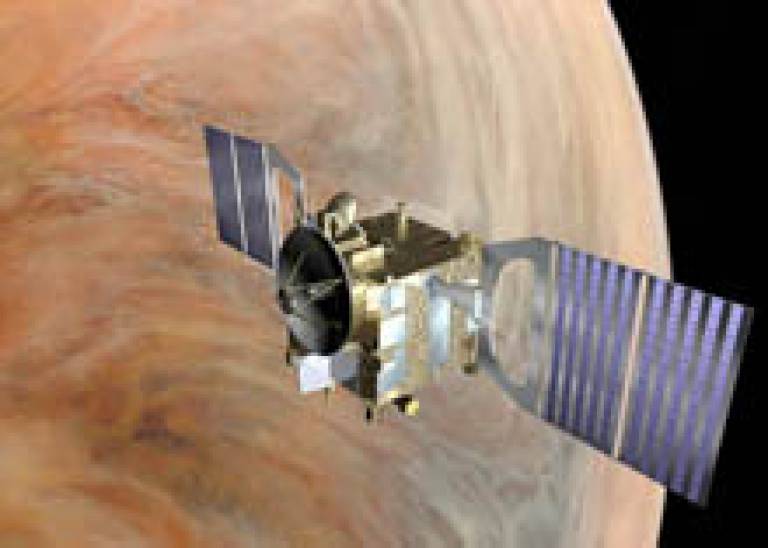Venus Express mission
19 October 2005
The European Space Agency (ESA) will launch the Venus Express mission on 9 November 2005.
 Scientists from the UCL Mullard Space Science Laboratory (MSSL) have been working on an instrument for the spacecraft.
Scientists from the UCL Mullard Space Science Laboratory (MSSL) have been working on an instrument for the spacecraft.
The launch was delayed from the original date of 26 October to allow for final cleaning and inspection after the discovery of contaminants in the spacecraft.
Despite being our closest planetary neighbour, little is known about Venus mainly because of its thick, impenetrable clouds and crushing surface atmospheric pressure. Principal among its secrets is why a planet so similar to Earth in size, mass and composition could have evolved so differently over the last four thousand million years.
Venus Express - the first global examination of the Venusian atmosphere, where the clouds are made of sulphuric acid and the surface temperature is 460˚C - will use newly discovered 'windows' in infrared light to probe the atmosphere under the clouds. Dr Andrew Coates, co-investigator on Venus Express said: "This will help to explain why the thick atmosphere rotates so quickly above the slowly rotating planetary surface, producing chevron-shaped clouds. It is suspected that the surface is volcanic, and other instruments will search for evidence of this."
Scientists at MSSL are working on one of the spacecraft's seven instruments. The 'Analyser of Space Plasma and Energetic Atoms' (ASPERA-4), will measure how the outer parts of the Venusian atmosphere are stripped away by the solar wind and lost to space. Similar to Mars, Venus has no magnetic shield to protect its atmosphere from this effect. In contrast, Earth's magnetic shield protects it from damaging solar wind and cosmic rays. ASPERA-4 will investigate the interaction between the solar wind and the atmosphere of Venus by measuring outflowing particles from the planet's atmosphere and the particles making up the solar wind, studying how molecules and ions escape from the planet.
The launch date has been set as the point when Venus and Earth are closest to each other. Venus Express will take five months to reach its destination, where it will circle the poles of Venus every 24 hours.
Dr Coates, who also worked on Mars Express, said: "In the case of Venus, it is thought that the stripping of the atmosphere may be constantly replenished by volcanism. On Mars, the atmosphere has been mostly scavenged away to space or frozen under the surface. By comparing these planetary environments, we can learn more about our own."
Image: Artist's impression of Venus Express orbiting Venus (ESA)
- Links: Venus Express
- MSSL
 Close
Close

